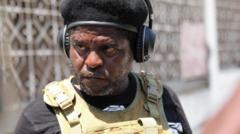In a significant move against U.S. deportation policies, President Nayib Bukele has declared that El Salvador will not accept the return of Kilmar Ábrego García, a man erroneously deported to a controversial mega-prison in El Salvador. This decision comes as Bukele strengthens ties with the Trump administration, which has come under scrutiny for its immigration practices and handling of civil rights issues in the region.
El Salvador Refuses to Repatriate Incorrectly Deported Man Amid Political Dynamics

El Salvador Refuses to Repatriate Incorrectly Deported Man Amid Political Dynamics
El Salvador's President Nayib Bukele stands firm against returning Kilmar Ábrego García, mistakenly deported by the U.S., amid rising tensions about immigration policies and human rights.
El Salvador will not return Kilmar Ábrego García, whom the US government deported to his home country and is currently detained in a mega-prison. President Nayib Bukele made the announcement during a meeting with Donald Trump, with whom he enjoys a strong relationship. The U.S. Supreme Court recently ruled that the Trump administration must facilitate Mr. Ábrego García's return, as he had previously been granted deportation protection.
The Trump administration, however, maintains that the decision to return him lies with El Salvador. Attorney General Pam Bondi stated, "It's up to El Salvador if they want to return him." This development comes as the U.S. seeks to deport individuals, particularly those labeled as gang members, to El Salvador under a partnership with Bukele, who has earned praise for his assertive stance on crime.
Ábrego García's lawyer asserts that he is not a gang member despite U.S. claims that he has ties to the MS-13 gang. The U.S. government admitted to mistakenly deporting him while also asserting that he is part of the gang, further complicating the affair. During the meeting, Trump expressed a willingness to deport more U.S. criminals to Salvadoran prisons, emphasizing the legal obstacles involved.
His wife, Jennifer Vasquez Sura, criticized the Trump and Bukele administrations for what she viewed as political maneuvering at the expense of her husband's life. Meanwhile, U.S. Secretary of State Marco Rubio noted that more alleged gang members have been deported to El Salvador, which has received over 200 deportees from the U.S. under dubious legal frameworks dating back to centuries.
Discussions surrounding the treatment of detainees in El Salvador's maximum-security prison, known as Cecot, have raised significant human rights concerns due to reported abuses and limited conditions for inmates. Critics argue that Bukele's aggressive crime policy has led to mass arrests, frequently without due process, amidst a state of emergency lasting three years.
Bukele’s alignment with the Trump administration serves his government well, as El Salvador earns financial support for accepting U.S. deportees and lessens scrutiny of domestic policy issues. As Bukele enhances bilateral relations, international observers worry about rising democratic challenges and human rights violations within El Salvador, as Trump continues to prioritize national security over humanitarian concerns in immigration policies.
This complex political landscape illustrates the intersection of U.S. domestic policies and Central American governance, raising critical questions about the implications for immigrants and labor markets in both nations.
The Trump administration, however, maintains that the decision to return him lies with El Salvador. Attorney General Pam Bondi stated, "It's up to El Salvador if they want to return him." This development comes as the U.S. seeks to deport individuals, particularly those labeled as gang members, to El Salvador under a partnership with Bukele, who has earned praise for his assertive stance on crime.
Ábrego García's lawyer asserts that he is not a gang member despite U.S. claims that he has ties to the MS-13 gang. The U.S. government admitted to mistakenly deporting him while also asserting that he is part of the gang, further complicating the affair. During the meeting, Trump expressed a willingness to deport more U.S. criminals to Salvadoran prisons, emphasizing the legal obstacles involved.
His wife, Jennifer Vasquez Sura, criticized the Trump and Bukele administrations for what she viewed as political maneuvering at the expense of her husband's life. Meanwhile, U.S. Secretary of State Marco Rubio noted that more alleged gang members have been deported to El Salvador, which has received over 200 deportees from the U.S. under dubious legal frameworks dating back to centuries.
Discussions surrounding the treatment of detainees in El Salvador's maximum-security prison, known as Cecot, have raised significant human rights concerns due to reported abuses and limited conditions for inmates. Critics argue that Bukele's aggressive crime policy has led to mass arrests, frequently without due process, amidst a state of emergency lasting three years.
Bukele’s alignment with the Trump administration serves his government well, as El Salvador earns financial support for accepting U.S. deportees and lessens scrutiny of domestic policy issues. As Bukele enhances bilateral relations, international observers worry about rising democratic challenges and human rights violations within El Salvador, as Trump continues to prioritize national security over humanitarian concerns in immigration policies.
This complex political landscape illustrates the intersection of U.S. domestic policies and Central American governance, raising critical questions about the implications for immigrants and labor markets in both nations.



















